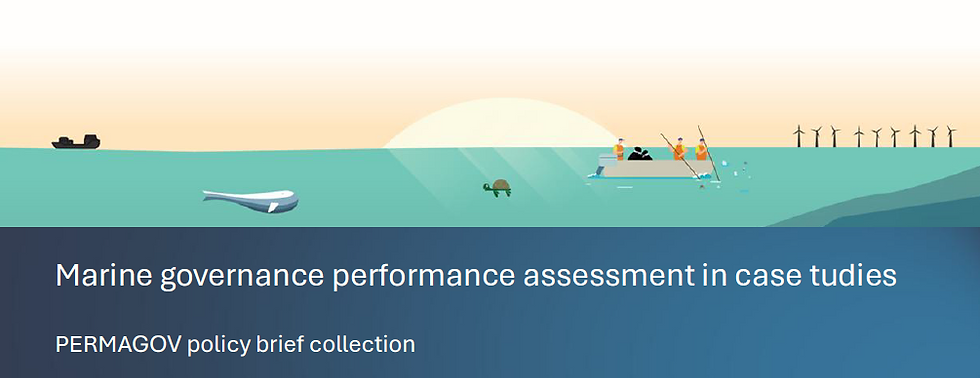Marine Litter In The Mediterranean Sea: An Introduction To Case Study 9
- pavel874
- Nov 5, 2023
- 3 min read

The Mediterranean Sea is known for its rich marine and coastal biodiversity, as well as being a hub of human activity and a lifeline for coastal communities. Despite a long-standing history of ambitious regional policies to tackle marine pollution under the Barcelona Convention, it remains one of the world’s most polluted seas in terms of plastic. Around 730 tonnes of plastic waste is estimated to end up in the Mediterranean every day, and in the near future there could be more tonnes of plastic than fish in the sea. Plastic pollution places this cradle of biodiversity and human life at risk.
Many efforts to tackle the problem have been attempted at the Mediterranean and EU level within different policy environments, from marine and land-based sources of plastics, to production, consumption, circularity and waste management. However, progress has been hampered by fragmentation and coordination challenges. The geopolitical landscape does not help in this regard as there are noticeable differences in capacities between Northern, Southern and Eastern Mediterranean riparian countries, not to mention the overlapping policy regimes at the EU and regional Mediterranean level.
Key to tackling the uncertainty and fragmentation within this regime is enhancing our holistic understanding of the sources, impacts, and solutions to marine plastics. Regional initiatives under UNEP/MAP, such as MedPOL and the Regional Action Plan on Marine Litter Management in the Mediterranean, are supporting this endeavour. However, many challenges have yet to be overcome to improve coordination and monitoring practices.
This case aims to analyse how data-driven monitoring at the EU and regional level enables or constrains the cross-sectoral and cross-border cooperation and coordination needed to a) address the growing policy layering between marine and plastic policies, and b) advance a collective and comprehensive approach to tackling multiple sources of plastic pollution.
Scope
The case study covers EU and non-EU waters of the Mediterranean Sea. Thematically, the focus is on data monitoring governance arrangements within the UNEP/MAP and EU policy arenas linked to marine litter, circularity and waste management. The main goal of the case study is to contribute to better coordination of data practices on marine plastics by identifying how and which data plays a role in the implementation of MSFD (Marine Strategy Framework Directive), the Barcelona Convention, and circular and plastic waste management policies in the EU.
Assumptions
Better collaboration and integration of data monitoring regimes across the Mediterranean basin can help increase our understanding of the pervasive nature and sources of marine plastics. This in turn should enhance the implementation and performance of marine plastic policies, including the MSFD and the Barcelona Convention's strategies and protocols.
Research questions
Which institutional barriers exist within the multi-layered governance arrangements (e.g. MSFD, UNEP/MAP), also in circularity and waste management policies, and how does the presence of these barriers impact the implementation of plastics reduction strategies in the Mediterranean?
How are marine plastics governance arrangements in the Mediterranean enabled or constrained by the dynamics between institutional barriers and formal and informal collaborations?
How do the marine plastics governance arrangements in the Mediterranean and dynamics within and between them enable or constrain the capabilities of actors to act on marine plastics?
How has e-governance been applied within the marine plastics regime in the Mediterranean region, and what are the strengths and weaknesses of different datasets and tools?
PERMAGOV partners
The case study is managed by Wageningen University in cooperation with Plan Bleu. The latter joined the case study to gain a deeper understanding of governance issues in this area and how they align with UNEP/MAP’s current perspectives. Plan Bleu wants to assist countries in the implementation of UNEP/MAP targets (Regional Action Plan, MTS 2016-2025) by defining more responsive and efficient programmes of work regarding marine plastic management. Plan Bleu will provide a series of recommendations based on the case study's results, including how to leverage e-governance to improve performance of marine policies dealing with plastics in the Mediterranean Sea.
Connection with other case studies
Marine litter in the Baltic Sea (case study 8): Although geographically and thematically different (case 8 covers lost fishing gear and cargo), it will be interesting to compare how different types of marine litter are addressed in the north and south of Europe
Marine Life (case studies three and four): There could be a potential connection with Marine Life cases given how plastic relates to both seabed integrity and to sustainable fishing e.g. preventing discarded fishing gear from ending up in the ocean. Even though geographically case study 3 is not relevant as it focuses on the Baltic Sea, there may be useful lessons from wider governance practices that could be useful for the Mediterranean context
Motorways of the sea in the Adtriatic Sea (case study 2): The Adtriatic Sea is the northernmost arm of the Mediterranean Sea. But beyond the geographic link, it's extremely useful to understand the impacts of motorways of the sea on marine plastic pollution












Comments